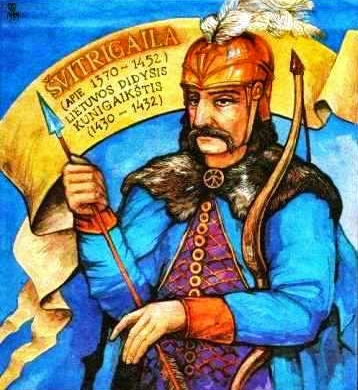| lithaz.org: home & art/culture events organizations publications |
| 5/15/2015 |
Lithuanian history:Švitrigaila
|
|
Švitrigaila, was born in Vilnius ca. 1370 to Grand Duke Algirdas of Lithuania and his second wife Uliana, daughter of Aleksander Mikhailovich, Prince of Tver. Švitrigaila was Uliana's youngest son and grew up in Vilnius. Before his death in 1377, Algirdas picked Jogaila, Švitrigaila's oldest brother, as his successor and Grand Duke of Lithuania, Švitrigaila later claimed that Algirdas stipulated that if Jogaila became a ruler of another country, Švitrigaila should become the Grand Duke of Lithuania. In 1386 Švitrigaila with other brothers accompanied Jogaila to Cracow, where they all were baptised as Roman Catholics during the ceremonies that crowned Jogaila the King of Poland. Švitrigaila's baptismal name was Boleslav. Residing in Cracow as King of Poland, Jogaila needed someone he trusted in Vilnius. His first choice was to name his younger brother Skirgaila as his viceregent in Vilnius. Later in 1392 Jogaila managed to reconcile with his cousin Vytautas, who had gone to Prussia and was helping the Teutonic Knights attack Lithuanian territories. To get Vytautas to come back to Lithuania, Jogaila returned confiscated Vytautas' family lands in Lithuania and turned over the rule in Vilnius to Vytautas. Švitrigaila's own claim to rule Lithuania was ignored. Another blow came after Uliana's death in 1392 - Jogaila appointed his falconer as ruler of Vitebsk, an action that Švitrigaila regarded as a violation of his inheritance rights. Švitrigaila went to Vitebsk and executed the newly appointed ruler. Jogaila responded by sending his brother Skirgaila and his cousin Vytautas after Švitrigaila in Vitebsk. Despite a brave defense, Švitrigaila was captured and sent in chains to Jogaila in Cracow, where he was placed under "honorable watch". Švitrigaila was kept in Cracow from 1393 until 1396. When released, Švitrigaila went to Hungary, Prussia, and Livonia making the case for his claim to the Grand Ducal title of Lithuania and seeking allies for his cause, but eventually had to reconcile with Jogaila and Vytautas and return to Lithuania. In 1399 he even participated in Vytautas' overly ambitious campaign against the Tatar Khan of the Golden Horde which ended with the disastrous defeat on August 12 at Vorksla River in today's Ukraine. Švitrigaila's half brothers Prince Andrei of Polotsk and Prince Dmitri of Bryansk, and many other princes and nobles perished. Švitrigaila and Vytautas managed to escape. On his return Jogaila gave him a fief in Podolia in 1400. But Švitrigaila would not give up on his attempts to rule in Vilnius. By 1402 Švitrigaila had left Podolia and was in Marienburg, Prussia, as a guest of the Teutonic Knights. When on Sept. 9, 1403 Pope Boniface IX forbade the Teutonic Knights from attacking Lithuania, Jogaila and Vytautas invited Švitrigaila to return home. In January of 1404 Švitrigaila came back to Vilnius, Lithuania. Jogaila gave him regions of Podolia, while Vytautas gave him Bryansk, Chernigov, and Trubchevsk. The same year Švitrigaila helped Vytautas quell a rebellion in Smolensk. Vytautas' actions in Ruthenia were opposed by Moscow and Švitrigaila decided to support Moscow against Vytautas in secret. When Vytautas found out of Švitrigaila's actions against him, Švitrigaila burned the castles that he ruled and escaped to Moscow on July 26, 1408. Švitrigaila's ambition to rule Lithuania was not realized while Vytautas was alive, but after Vytautas' death in 1430, Orthodox Christian magnates in Lithuania, who wanted more independence from the influence of Polish Catholic nobility, proclaimed Švitrigaila as Grand Duke of Lithuania because he supported Lithuania's independence from Poland. Not pleased by the Orthodox magnates' action, Jogaila, however, decided not to challenge it. Švitrigaila quickly moved to occupy the castles in Vilnius and Trakai. He also granted his Orthodox subjects equality with the Catholics. Polish lords had long wanted to annex to Poland the regions of Podolia ruled by Vytautas. When Vytautas died and Jogaila with a delegation was visiting Vilnius, Polish forces moved in, captured Lithuania's governor of Podolia and took key fortresses. In Vilnius Švitrigaila demanded of Jogaila to reverse the Polish actions and posted his guards around the visiting delegation. Jogaila complied with Švitrigaila's demands but was not obeyed by the Polish commanders. Fighting broke out between Švitrigaila's and Polish forces. Švitrigaila, however, did not succeed militarily and negotiated a two year truce. Švitrigaila did not succeed politically either. In 1433 he was deposed by elements of Polish-leaning Lithuanian magnates in favor of Vytautas' younger brother Žygimantas. Švitrigaila managed to escape and find allies for his unsuccessful struggle to regain his rule in Vilnius. Švitrigaila died on February 10, 1452 in Lutsk, Volhynia. He was about 82 years old. His body was brought back to Lithuania and was buried in the cathedral in Vilnius. Living in the shadow of his oldest brother Jogaila and his cousin Vytautas the Great, Švitrigaila had to struggle for his place in the sun. He never gave up without a fight. As a ruler, however, he did not succeed.
We know precious little about his family life, except that he married Anna, daughter of Prince Ivan of Tver, nephew of Švitrigaila's mother Uliana. Švitrigaila and Anna had only one child, a son who died in infancy.(Click here to read more history.) |
